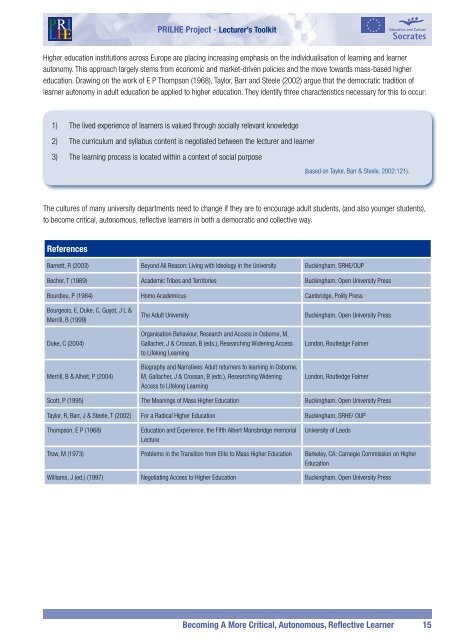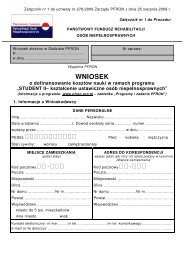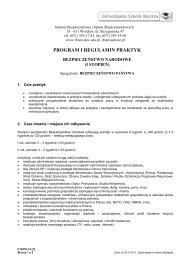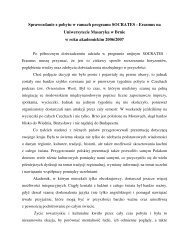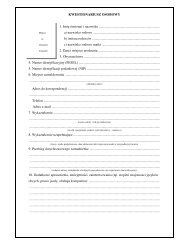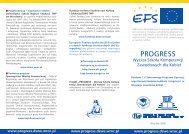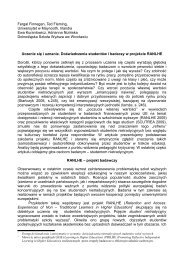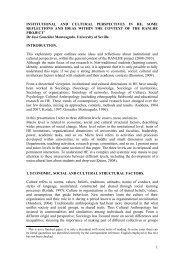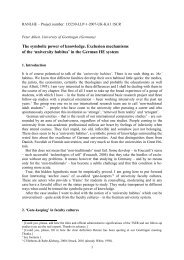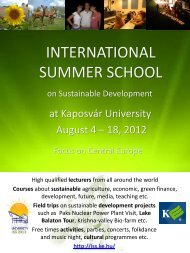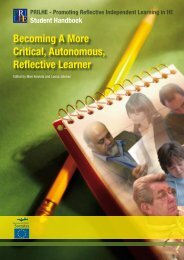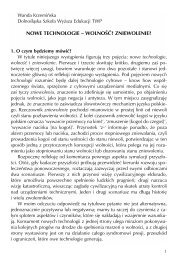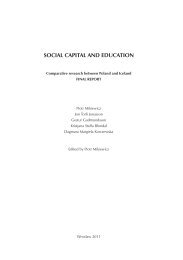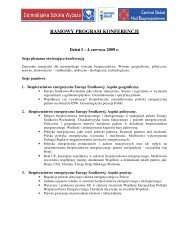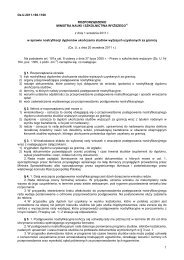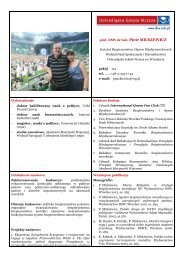Becoming A More Critical, Autonomous, Reflective Learner
Becoming A More Critical, Autonomous, Reflective Learner
Becoming A More Critical, Autonomous, Reflective Learner
Create successful ePaper yourself
Turn your PDF publications into a flip-book with our unique Google optimized e-Paper software.
PRILHE Project - Lecturer’s Toolkit<br />
Higher education institutions across Europe are placing increasing emphasis on the individualisation of learning and learner<br />
autonomy. This approach largely stems from economic and market-driven policies and the move towards mass-based higher<br />
education. Drawing on the work of E P Thompson (1968), Taylor, Barr and Steele (2002) argue that the democratic tradition of<br />
learner autonomy in adult education be applied to higher education. They identify three characteristics necessary for this to occur:<br />
1) The lived experience of learners is valued through socially relevant knowledge<br />
2) The curriculum and syllabus content is negotiated between the lecturer and learner<br />
3) The learning process is located within a context of social purpose<br />
(based on Taylor, Barr & Steele, 2002:121).<br />
The cultures of many university departments need to change if they are to encourage adult students, (and also younger students),<br />
to become critical, autonomous, reflective learners in both a democratic and collective way.<br />
References<br />
Barnett, R (2003) Beyond All Reason: Living with Ideology in the University Buckingham, SRHE/OUP<br />
Becher, T (1989) Academic Tribes and Territories Buckingham, Open University Press<br />
Bourdieu, P (1984) Homo Academicus Cambridge, Polity Press<br />
Bourgeois, E, Duke, C, Guyot, J L &<br />
Merrill, B (1999)<br />
Duke, C (2004)<br />
Merrill, B & Alheit, P (2004)<br />
The Adult University<br />
Organisation Behaviour, Research and Access in Osborne, M,<br />
Gallacher, J & Crossan, B (eds.), Researching Widening Access<br />
to Lifelong Learning<br />
Biography and Narratives: Adult returners to learning in Osborne,<br />
M, Gallacher, J & Crossan, B (eds.), Researching Widening<br />
Access to Lifelong Learning<br />
Buckingham, Open University Press<br />
London, Routledge Falmer<br />
London, Routledge Falmer<br />
Scott, P (1995) The Meanings of Mass Higher Education Buckingham, Open University Press<br />
Taylor, R, Barr, J & Steele, T (2002) For a Radical Higher Education Buckingham, SRHE/ OUP<br />
Thompson, E P (1968)<br />
Education and Experience, the Fifth Albert Mansbridge memorial<br />
Lecture<br />
University of Leeds<br />
Trow, M (1973) Problems in the Transition from Elite to Mass Higher Education Berkeley, CA: Carnegie Commission on Higher<br />
Education<br />
Williams, J (ed.) (1997) Negotiating Access to Higher Education Buckingham, Open University Press<br />
<strong>Becoming</strong> A <strong>More</strong> <strong>Critical</strong>, <strong>Autonomous</strong>, <strong>Reflective</strong> <strong>Learner</strong> 15


